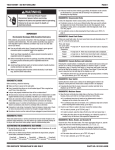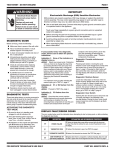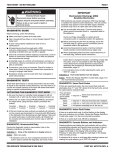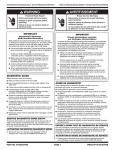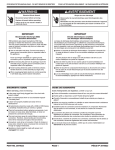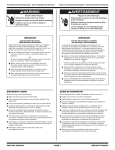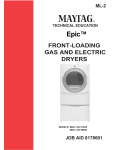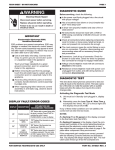Download Whirlpool GEW9868KT Troubleshooting guide
Transcript
TECH SHEET - DO NOT DISCARD WARNING Electrical Shock Hazard Disconnect power before servicing. Replace all parts and panels before operating. Failure to do so can result in death or electrical shock. PAGE 1 DIAGNOSTIC GUIDE Before servicing, check the following: ■ Is the power cord firmly plugged into a live circuit with proper voltage? ■ Has a household fuse blown or circuit breaker tripped? Time delay fuse? ■ Is dryer vent properly installed and clear of lint or obstructions? ■ All tests/checks should be made with a VOM or DVM having a sensitivity of 20,000 ohms per volt DC or greater. ■ Check all connections before replacing components. Look for IMPORTANT Electrostatic Discharge (ESD) Sensitive Electronics ESD problems are present everywhere. ESD may damage or weaken the electronic control assembly. The new control assembly may appear to work well after repair is finished, but failure may occur at a later date due to ESD stress. ■ Use an anti-static wrist strap. Connect wrist strap to green ground connection point or unpainted metal in the appliance -ORTouch your finger repeatedly to a green ground connection point or unpainted metal in the appliance. ■ Before removing the part from its package, touch the anti-static bag to a green ground connection point or unpainted metal in the appliance. ■ Avoid touching electronic parts or terminal contacts; handle electronic control assembly by edges only. ■ When repackaging failed electronic control assembly in anti-static bag, observe above instructions. broken or loose wires, failed terminals, or wires not pressed into connectors far enough. ■ The most common cause for control failure is corrosion on connectors. Therefore, disconnecting and reconnecting wires will be necessary throughout test procedures. ■ Connectors: Look at top of connector. Check for broken or loose wires. Check for wires not pressed into connector far enough to engage metal barbs. ■ Resistance checks must be made with power cord unplugged from outlet. DIAGNOSTIC TEST This test allows factory/service personnel to test and verify all inputs to the electronic control. The basic operation of this test is to notify the operator with an audible beep every time the status of an input to the control changes state. Activating the Diagnostic Test Mode 1. Unit must be in Standby (unit plugged in, display off). 2. Alternately press the More Time ∧, Less Time ∨ touchpads two times. All LED’s should light and the display should show 88. If any of these initial conditions are not satisfied, the control will not enter the test mode. NOTES: If a flashing E1 or E2 appears in the display, proceed to the thermistor test (TEST #3a), page 5. DISPLAY FAULT/ERROR CODES DISPLAY DESCRIPTION PF POWER FAILURE E1 E2 E3 EXPLANATION AND RECOMMENDED PROCEDURE “PF” flashes after a power failure while the dryer is running. Press Start to continue the cycle, or press Stop/Cancel to clear the display. “E1” flashes if the thermistor is open. THERMISTOR OPEN See TEST #3a, page 5. THERMISTOR SHORTED USER INTERFACE OR SOFTWARE MISMATCH “E2” flashes if the thermistor has shorted. See TEST #3a, page 5. “E3” flashes when there is a keyswitch or software mismatch. This error code will ONLY appear when in the Diagnostic Test mode. See TEST #5, page 6. If a flashing E3 appears in the display, unplug dryer or disconnect power. Check the component part numbers of the control panel/ touchpad assembly and the electronic control assembly to see if they match the part numbers in the chart, page 3. Replace either component if they are incorrect. If the component part numbers are correct, plug in dryer or reconnect power, reenter the Diagnostic Test mode above, and proceed with the following Console Switches and Indicators Test. The display will always display the “E3”. The indicator LEDs should go off as the touchpads are pressed. If the LEDs do not turn off, replace the touchpad assembly. If all LEDs function properly, proceed to TEST #5, page 6. Test Mode Functionality When the control is in the Diagnostic Test mode, every input change of state will result in a beep, including the Door Switch, and the Moisture Sensor (short/open Sensor will result in a beep). NOTE: A moistened finger or damp cloth may also be used. Refer to table on next page to test console touchpad. FOR SERVICE TECHNICIAN'S USE ONLY PART NO. 8541836 PAGE 2 TECH SHEET - DO NOT DISCARD CONSOLE SWITCHES AND INDICATORS TEST PRESS TOUCHPAD DISPLAY Heavy Duty 88 88 88 88 88 88 88 88 88 88 88 88 88 88 88 88 88 88 88 88 88 88 88 88 88 88 88 88 8 88 8 88 repeat Towels/Cotton repeat Normal repeat Bulky Items repeat Casual repeat Delicate repeat More Dry repeat Less Dry repeat Timed Dry repeat Rack Dry repeat Touch Up repeat Temp repeat Cycle Signal repeat Wrinkle Shield repeat More Time repeat Less Time repeat Start repeat Stop/Cancel 03 or 05 88 88 CONTROL ACTION Beep sound. “Heavy Duty” LED is turned off. Beep sound. “Heavy Duty” LED is turned on. Beep sound. “Towels/Cotton” LED is turned off. Beep sound. “Towels/Cotton” LED is turned on. Beep sound. “Normal” LED is turned off. Beep sound. “Normal” LED is turned on. Beep sound. “Bulky Items” LED is turned off. Beep sound. “Bulky Items” LED is turned on. Beep sound. “Casual” LED is turned off. Beep sound. “Casual” LED is turned on. Beep sound. “Delicate” LED is turned off. Beep sound. “Delicate” LED is turned on. Beep sound. Five (5) dryness level LEDs are turned off. Beep sound. Five (5) dryness level LEDs are turned on. Beep sound. Five (5) dryness level LEDs are turned off. Beep sound. Five (5) dryness level LEDs are turned on. Beep sound. “Timed Dry” LED is turned off. Beep sound. “Timed Dry” LED is turned on. Beep sound. “Rack Dry” LED is turned off. Beep sound. “Rack Dry” LED is turned on. Beep sound. “Touch Up” LED is turned off. Beep sound. “Touch Up” LED is turned on. Beep sound. Six (6) associated LEDs for “Temp” are turned off. Beep sound. Six (6) associated LEDs for “Temp” are turned on. Beep sound. LEDs for “Louder”, “Softer”, “Off”, and “Estimated Time Remaining” are turned off. Beep sound. LEDs for “Louder”, “Softer”, “Off”, and “Estimated Time Remaining” are turned on. Beep sound. “Wrinkle Shield” LED is turned off. Beep sound. “Wrinkle Shield” LED is turned on. Beep sound. Left digit of “88” display is turned off. Beep sound. Left digit of “88” display reappears. Beep sound. Right digit of “88” display is turned off. Beep sound. Right digit of “88” display reappears. Beep sound. Six (6) associated “Status” LEDs are turned off and relays are activated. Beep sound. Six (6) associated “Status” LEDs are turned on and relays are deactivated. Beep sound. All LEDs are turned off. If pressing any of the above touchpads does not result in the correct action, refer to TEST #5, page 6. PART NO. 8541836 FOR SERVICE TECHNICIAN'S USE ONLY TECH SHEET - DO NOT DISCARD PAGE 3 ELECTRIC DRYER WIRING DIAGRAM IMPORTANT: Electrostatic (static electricity) discharge may cause damage to electronic control assemblies. See page 1 for details. RED - LINE L2 L1 LINE - BLACK 240 VOLTS WHITE - NEUTRAL 120 VOLTS N DRUM LAMP BK NEUTRAL TERMINAL LINKED TO CABINET BROWN DL BLACK WHITE P1-5 DOOR L1 NEUTRAL P3 USER INTERFACE MOTOR (ACTIVE OVERLAY or ALTERNATE TECHNOLOGY) PT-1 BLUE P1-3 P1-1 GRN/YEL WHITE BLUE LT BLUE THERMAL FUSE 196° F (91° C) 5M P4 4M MOIST. MOIST RTN HEATER RELAY N.O. HEATER +V MODEL MODEL RTN (0.250 TERMINAL) COM (0.250 TERMINAL) HEATER RTN TEMP. P2-1 YEL/RED P2-4 P2-5 RED/WHT TEMP RTN P2-6 N.C. P2-7 BLK BELT SWITCH G SENSOR P2-2 BLK P2-3 CENTRIFUGAL SWITCH MAIN 2.4-3.6 START 2.4-3.8 3M 2M 1M 6M DRIVE MOTOR 1/3 H.P. SENSOR MOVS THERMISTOR 10k ±3% ELECTRONIC CONTROL NC RED BLACK THERMAL CUT-OFF (TCO) 350° F (176° C) Console White Blue Light Motor Mounting Heater Screw Relay Relay Blue Green/ Yellow Black N.O. G DOOR SWITCH WHITE P1-2 NEUTRAL P1-4 BLUE RED/WHITE RED HIGH LIMIT THERMOSTAT 250° F (121° C) HEATER 7.8-11.8 Red/ Open Black White Black Open Yellow/Red Drum Size: Drum Speed: 7.4 cubic feet 51.5 ± 3 RPM CW Start Winding Main Winding Black Date CodeYDDD P/N XXXXXXX Rev X COM Blue Violet White Green/ Yellow Red Red Electronic Control PART NUMBER COMPONENT Console Panel/Touchpad Assembly for White Model: GEW9868KQ COMPONENT Pluggable Drive Motor Switch PART NUMBER Thermal Cut-Off 3977394 3978825 Thermal Fuse 3392519 Contacts for Bisque Model: GEW9868KT 3978825 Heat Element Assembly 3392661 for Graphite Model: GEW9868KL 3978826 High Limit Thermostat 3390291 Electronic Control Assembly 3978916/ 3980061 Drive Motor 8538263 Start Main Harness 8529981 Thermistor - NTC 10k Ohms 3976615 Run Door Switch 3406107 Belt Switch 8066134 Wire Harness, Moisture Sensor (w/MOVs) 3406653 FOR SERVICE TECHNICIAN'S USE ONLY Function 1M 2M 3M 5M 6M = Contacts closed Centrifugal Switch (Motor) PART NO. 8541836 PAGE 4 TECH SHEET - DO NOT DISCARD TROUBLESHOOTING GUIDE PROBLEM POSSIBLE CAUSE / TEST NOTE: Possible Cause/Tests MUST be performed in the sequence shown for each problem. 1. Supply connections. See WON’T POWER UP. TEST #1 below. (No response when 2. Check harness connections. touchpads are 3. Touchpad/LED assembly. pressed.) See TEST #5, page 6. 1. See TEST #1 below. WON’T START CYCLE. 2. Check harness connections. 1. Check Stop/Cancel touchpad. See TEST #5, page 6. WON’T SHUT OFF. 2. Touchpad/LED assembly. See TEST #5, page 6. 3. Moisture Sensor. See TEST #4, page 6. CONTROL WON’T Touchpad/LED assembly. ACCEPT See TEST #5, page 6. SELECTIONS. 1. Motor. See TEST #2 below. WON’T RUN. 2. Check harness connections. 1. Heater. See TEST #3, page 5. WON’T HEAT. 2. Check harness connections. 3. Check installation. Thermistor. See TEST #3c, HEATS IN AIR CYCLE. page 6. SHUTS OFF Moisture Sensor. See TEST #4, BEFORE CLOTHES page 6. ARE DRY. TROUBLESHOOTING TESTS TEST #1 Supply Connections 1. Unplug dryer or disconnect power. 2. Remove the cover plate from the back of the dryer. 3. With an ohmmeter, check for continuity between the neutral (N) terminal of the plug and the center contact on the terminal block. See figure 1. N L1 Terminal Block 5. Access the electronic control without disconnecting any wiring to it. 6. With an ohmmeter, check for continuity between the L1 terminal of the plug (found in step 4) and P1-5 (black wire) on the electronic control. Drum Belt ➔ If there is continuity, go to step 7. ➔ If there is no continuity, check that wires to the terminal block are mechanically secure. If so, repair or replace the main wire harness and test the dryer. Figure 2. Carefully remove drum belt. ➔ Remove the white connector from the drive motor switch. See figure 3. 7. Check for continuity between the neutral (N) terminal of the plug and P1-2 (white wire) on the electronic control. ➔ If there is continuity, go to step 8. ➔ If there is no continuity, replace the power cord and test the dryer. ➔ If there is continuity, go to step 4. PART NO. 8541836 Drive Motor Switch White Connector ➔ If there is no continuity and the mechanical connections of the wire are secure, repair or replace the main wire harness. 8. Replace the electronic control. 9. If the dryer still does not operate, replace the console panel/touchpad assembly. Figure 3. Remove white connector. Motor Circuit Test This test will check the wiring to the motor and the motor itself. The following items are part of this system: – – – – – – Harness connection Thermal fuse Belt/belt switch Motor Door switch Electronic control (See ESD information, page 1) 1. Unplug dryer or disconnect power. ➔ If resistance across P1-3 and P1-4 is in the range of 1 to 6 ohms, replace the electronic control. 3. Check the wiring and components in the path between these measurement points by referring to the wiring diagram, page 3. ➔ Check the thermal fuse. See TEST #3b, page 6. ➔ If motor and harness connections appear good, remove the white connector from the drive motor switch and check resistance of motor’s Main and Start winding coils as shown on page 3 and in the table below. NOTE: Main and Start winding coils must be checked at the motor. ➔ Otherwise, go to step 3. Figure 1. Plug-to-terminal connections for electric dryer. Belt Switch Pulley ➔ If neither of the plug terminals have continuity with the left-most contact of the terminal block, replace the power cord and test the dryer. 2. Access the electronic control and measure the resistance across P1-3 and P1-4. COM ➔ Access and check the belt switch and motor. Carefully remove the drum belt from the spring-loaded belt switch pulley, gently letting the belt switch pulley down. See figure 2. ➔ When this is found, go to step 5. TEST #2 This test assumes that proper voltage is present at the outlet, and visual inspection indicates that the power cord is securely fastened to the terminal block. Power Cord Plug 4. In a similar way, check which terminal of the plug is connected to the left-most contact on the terminal block and make a note of it. This will be L1 (black wire) in the wiring diagram. See figure 1. WINDING RESISTANCE (Ω) CONTACT POINTS OF MEASUREMENT MAIN 2.4–3.6 Ω 4 to 5 START 2.4–3.8 Ω 4 to 3 ➔ If the resistance at the motor is correct, there is an open circuit between the motor and electronic control. Check for failed belt switch. 4. Check the belt switch by measuring resistance between the belt switch wires, as shown in figure 4, while pushing up the belt switch pulley. ➔ If the resistance reading goes from infinity to a few ohms as pulley arm closes the switch, belt switch is OK. If not, replace the belt switch. FOR SERVICE TECHNICIAN'S USE ONLY TECH SHEET - DO NOT DISCARD PAGE 5 ➔ If belt switch is OK and there is still an open circuit, check and repair the wiring harness. Heater Element Thermal Cut-Off TEST #3a Thermistor Test NOTE: This test is started with the machine completely assembled. High Limit Thermostat Belt Switch Wires The electronic control monitors the exhaust temperature using the thermistor, and cycles the heater relay on and off to maintain the desired temperature. Begin with an empty dryer and a clean lint screen. 1. Plug in dryer or reconnect power. 2. Set the following configuration: Belt Switch Pulley ➔ Door - must be firmly closed. Belt Switch ➔ Press Timed Dry. Figure 4. Checking the belt switch. ➔ Press Cycle Signal and select Louder. Thermal Fuse ➔ If the Start winding is in question and the resistance is much greater than 4 Ω, replace the motor. 5. Door Switch problems can be uncovered in the Test Mode Functionality section, page 1. If this was not done, the following can be done without applying power to the dryer. Connect an ohmmeter across P1-2 (neutral, white wire) and P1-3 (door, blue wire). ➔ With the door properly closed, the ohmmeter should indicate a closed circuit (0–2 ohms). Thermistor Figure 5. Thermal Components, viewed from front. 3. Using an ohmmeter and referring to the wiring diagram, measure the resistance from the red wire at the heater relay to the red wire at the heater. ➔ If the resistance is about 10 ohms, go to step 5. ➔ If an open circuit is detected, go to step 4. ➔ If not, replace the door switch assembly. TEST #3 Heater Test This test is performed when either of the following situations occur: ✔ Dryer doesn’t heat ✔ Heat won’t shut off This test checks the components making up the heating circuit. The following items are part of this system: – – – – – – – – – Harness/connection Heater relay Thermal cut-off High limit thermostat Heat element assembly Centrifugal switch Thermistor Console panel/touchpad assembly Electronic control (See ESD information, page 1) 4. Visually check the wire connections to the thermal cut-off, high limit thermostat, and heater. If connections look good, check for continuity across each of these components. Replace the one that is electrically open. 5. If no open circuit is detected, measure the resistance between P2-5 (red/white wire) and P2-6 (black wire) at the electronic control. ➔ If 6–7 k ohms are measured, replace the electronic control. ➔ If the resistance is less than 1 k ohm, replace the thermistor. Heat will not shut off: 1. Unplug dryer or disconnect power. 2. Access the electronic control, and measure the resistance between P2-5 (red/white wire) and P2-6 (black wire). See Electronic Control illustration, page 3. Dryer does not heat: 1. Unplug dryer or disconnect power. ➔ If 6–7 k ohms are measured, replace the electronic control. ➔ Press Start. 3. If after 60 seconds, E1 or E2 flashes in the display and the dryer shuts off, the thermistor or wire harness is either shorted or open. ➔ Unplug dryer or disconnect power. ➔ Check wire connections at the electronic control and thermistor. If wire connections are good, remove the two wires from the thermistor and check the thermistor. 4. Check the resistance of the thermistor. NOTE: All thermistor resistance measurements must be made while dryer is disconnected from power. ➔ A hair dryer may be used to heat the thermistor. The table below gives the resistance values that should be observed for the various temperatures. THERMISTOR RESISTANCE TEMP. °F (°C) RES. kΩ TEMP. °F (°C) RES. kΩ 50° (10°) 19.9 110° (43°) 4.7 60° (16°) 15.3 120° (49°) 3.7 70° (21°) 11.9 130° (54°) 3.1 80° (27°) 9.2 140° (60°) 2.5 90° (32°) 7.4 150° (66°) 2.1 100° (38°) 5.7 160° (71°) 1.7 ➔ If the thermistor resistance does not agree with table, replace the thermistor. ➔ If the thermistor resistance checks within normal limits, replace the electronic control. ➔ If the resistance is much greater than 7 k ohms, replace the thermistor. 2. Remove the toe panel to access the thermal components. See figure 5. FOR SERVICE TECHNICIAN'S USE ONLY PART NO. 8541836 PAGE 6 TEST #3b Thermal Fuse Test 1. Unplug dryer or disconnect power. 2. Access the thermal fuse by removing the toe panel. The thermal fuse is wired in series with the dryer drive motor. ➔ If the thermal fuse is open, replace it. Check for failed thermistor, shorted heat element, blocked vent or other cause of failure. See figure 5, page 5. TEST #3c Thermal Cut-Off Test If the dryer does not heat, check the status of the thermal cut-off. 1. Unplug dryer or disconnect power. 2. Access the thermal cut-off by first removing the toe panel. 3. Using an ohmmeter, check the continuity across the thermal cut-off. See figure 5, page 5 for location. ➔ If the thermal cut-off is open, replace the thermal cut-off and high limit thermostat. In addition, check for failed heat element, or blocked or improper exhaust system. TEST #4 TECH SHEET - DO NOT DISCARD 4. Locate the two metal sensor strips on the face of the lint screen housing. Bridge these strips with a wet cloth or finger. ➔ If a beep is heard and a software revision number is displayed on the console, the sensor passes the test. Go to step 5. ➔ If the ohmmeter does not indicate (infinity) open circuit, go to step 6. Drum ✔ None of the LEDs light up ✔ A particular group of LEDs does not light up ✔ A single LED does not light up ✔ No beep sound is heard ✔ No dryer function is activated ✔ E3 error code is displayed None of the LEDs light up: 1. See Diagnostic Guide section, page 1. FRONT 2. Visually check that connectors P3 and P4 are inserted all the way into the electronic control. If these connections are good, perform the checks described in Checking Touchpad Function box, page 7. Harness Connection Blower Housing 2. Enter the Diagnostic Test mode. See procedure, page 1. NOTE: Over drying may be caused by a short circuit in the sensor system. Refer to the Diagnostic Test, page 1 and activate the Diagnostic Test mode. Check for the following situations: when a particular touchpad is pressed – Harness/connection – Metal sensor strips – Electronic control (See ESD information, page 1) ➔ Otherwise, go to step 5. ➔ If the problem persists after replacing the moisture sensor and thermistor, replace the electronic control. Touchpad and LED Test 6. Access the moisture sensor by removing the toe panel. Disconnect the sensor from the wire harness. See figure 6. The following items are part of this system: ➔ If this doesn't happen, go to step 4. 10. If moisture sensor diagnostic test passes, check the thermistor: Perform TEST #3a, page 5. TEST #5 ➔ Otherwise, measure the resistance between pins 1 and 2 of connector P2 on the electronic control. If a resistance less than 1 MΩ is measured, inspect the control board for any debris bridging these pins. If no debris, replace the electronic control. NOTE: Dryer will shut down automatically after 2½ hours. 3. Open the dryer door. If a beep tone is heard and a software revision number is displayed on the console as soon as the door is opened, a short circuit exists in the moisture sensor system. ➔ If a resistance less than infinity is measured, replace this component (Wire Harness, Moisture Sensor). 5. Unplug dryer or disconnect power. Access the electronic control and remove the connector P2. Measure the resistance across terminals 1 (yellow/red wire) and 2 (black wire). This test is performed when an automatic cycle stops too soon, or runs much longer than expected. 1. Plug in dryer or reconnect power. 9. Measure the resistance across each of the outermost contacts and the center terminal (ground connection). ➔ If not, unplug dryer or disconnect power. Access the moisture sensor wires by removing the toe panel and disconnecting the sensor wires from the harness. See figure 6. Go to step 9. Moisture Sensor Test NOTE: This test is started with the machine completely assembled. 8. Measure the resistance across the pins of the mating connector. If a small resistance is measured here, replace this harness (Main Wire Harness). A particular group of LEDs does not light up: A group or combination of LEDs share a common electronic connection. If this connection is open, all of the LEDs in the group will be disabled. Replace the console panel/touchpad assembly. A single LED does not light up: Figure 6. Disconnect sensor from wire harness. 7. Measure the resistance across the outermost contacts of the cable that includes the two red MOVs. ➔ If a small resistance is measured, replace this component (Wire Harness, Moisture Sensor). Press the touchpad associated with the LED several times. If the LED does not light up, the LED has failed. Replace the console panel/touchpad assembly. No beep sound is heard: If the associated LEDs do light up, it is possible that the beeper circuit has failed. Check touchpad functioning (see box, page 7) before replacing the electronic control. ➔ Otherwise go to step 8. PART NO. 8541836 FOR SERVICE TECHNICIAN'S USE ONLY TECH SHEET - DO NOT DISCARD PAGE 7 CHECKING TOUCHPAD FUNCTION Before replacing the electronic control, check for proper touchpad functioning as follows: ■ Unplug dryer or disconnect power. ■ Remove connectors P3 and P4 from the electronic control (see electronic control illustration, page 3). ■ Using the table at right, measure the resistance across the switch when the touchpad is pressed. NOTE: The meter must be connected with the proper polarity. ➔ If the meter responds to the touchpad being pressed, it indicates the touchpad is operating. The touchpad is a momentary connection, so the meter can respond only while the touchpad is being pressed. TOUCHPAD + LEAD – LEAD Heavy Duty P3-14 P3-11 Towels/Cotton P3-14 P3-9 Normal P3-13 P3-11 Bulky Items P3-13 P3-10 Casual P3-12 P3-11 Delicate P3-12 P3-10 More Dry P3-14 P3-8 Less Dry P3-14 P3-7 Timed Dry P3-13 P3-9 P3-10 Rack Dry P3-14 Touch Up P3-12 P3-9 Temp P3-12 P3-8 Cycle Signal P3-12 P4-2 Wrinkle Shield P3-13 P3-8 ➔ If any switches fail this test, replace the console panel/touchpad assembly. More Time P3-13 P3-7 Less Time P3-12 P3-7 ➔ If all switches test OK, replace the electronic control (see below). Stop/Cancel P3-13 P4-2 Start P3-14 P4-2 No dryer function is activated when a particular touchpad is pressed: If the associated LEDs do light up, it is possible that the electronic control has failed. Check touchpad functioning (see box above) before replacing the electronic control. ELECTRONIC CONTROL REMOVAL OR REPLACEMENT NOTE: Be sure to perform the Diagnostic Test before replacing the electronic control. See page 1. E3 error code is displayed: If the E3 error code is displayed, there is a user interface or software mismatch. It is possible that a component on the keyswitch or the electronic control has failed. Check touchpad functioning (see box above) before replacing the electronic control. IMPORTANT: Electrostatic (static electricity) discharge may cause damage to electronic control assemblies. See page 1 for details. To remove electronic control: 1. Unplug dryer or disconnect power. 2. Remove all connectors from the electronic control. 3. Remove the console mounting screw, located near the transformer. See electronic control illustration, page 3. 4. Push the mounting legs on both sides of the electronic control toward each other. Lift the electronic control away from the bracket. To replace electronic control: 1. Attach electronic control mounting legs to the bracket. 2. Insert the console mounting screw into the hole near the transformer. See electronic control illustration, page 3. 3. Plug all connectors into the electronic control. 4. Plug in dryer or reconnect power. FOR SERVICE TECHNICIAN'S USE ONLY PART NO. 8541836 PAGE 8 TECH SHEET - DO NOT DISCARD MANUFACTURED UNDER ONE OR MORE OF THE FOLLOWING U.S. PATENTS: 4,385,452 4,430,809 4,663,861 4,669,200 4,700,495 4,720,925 4,754,556 4,821,535 4,840,285 4,865,366 4,899,264 4,899,464 4,908,959 5,066,050 5,243,771 5,560,120 5,636,453 5,651,188 5,664,339 D314,261 D314,262 PART NO. 8541836 FOR SERVICE TECHNICIAN'S USE ONLY









